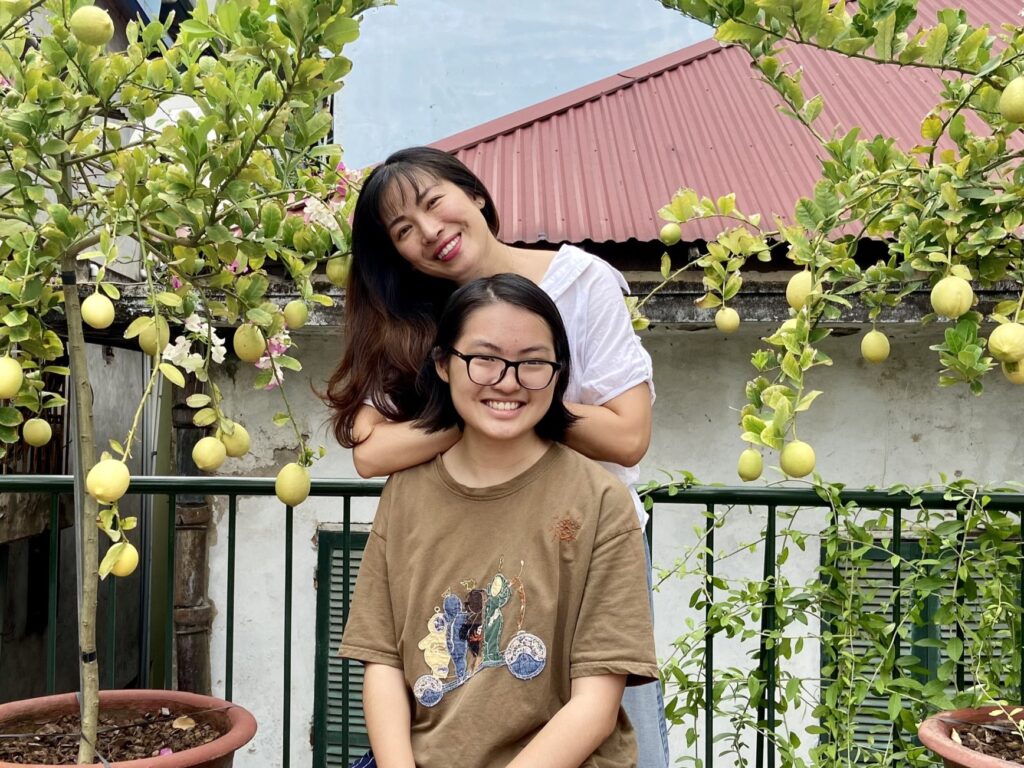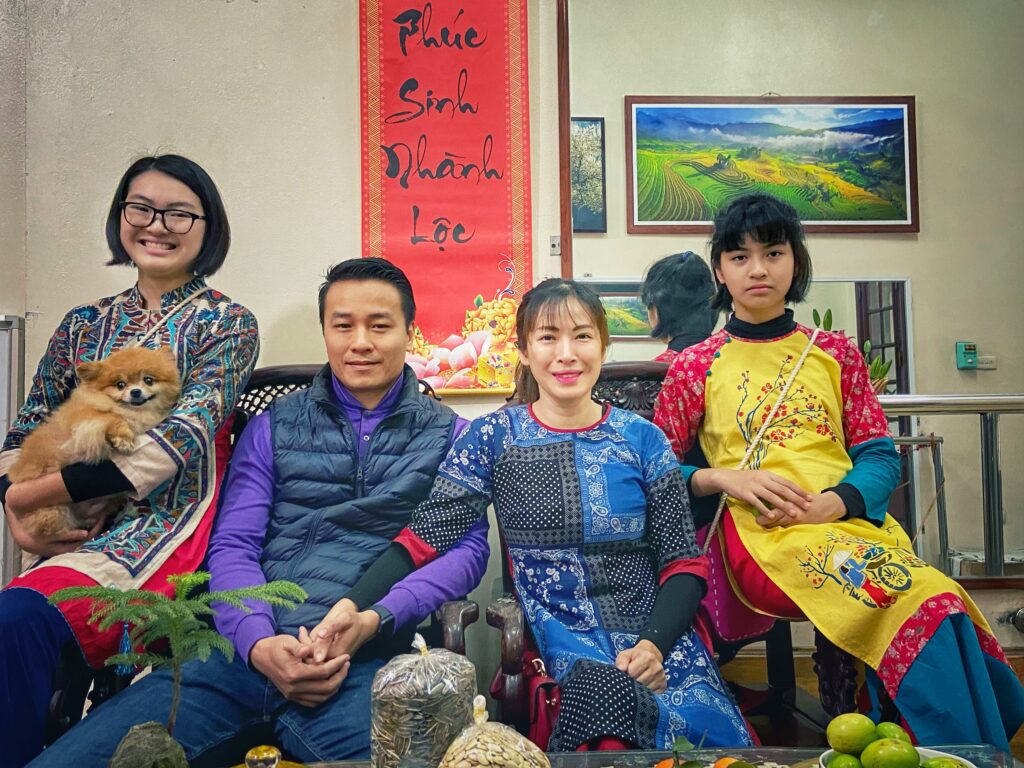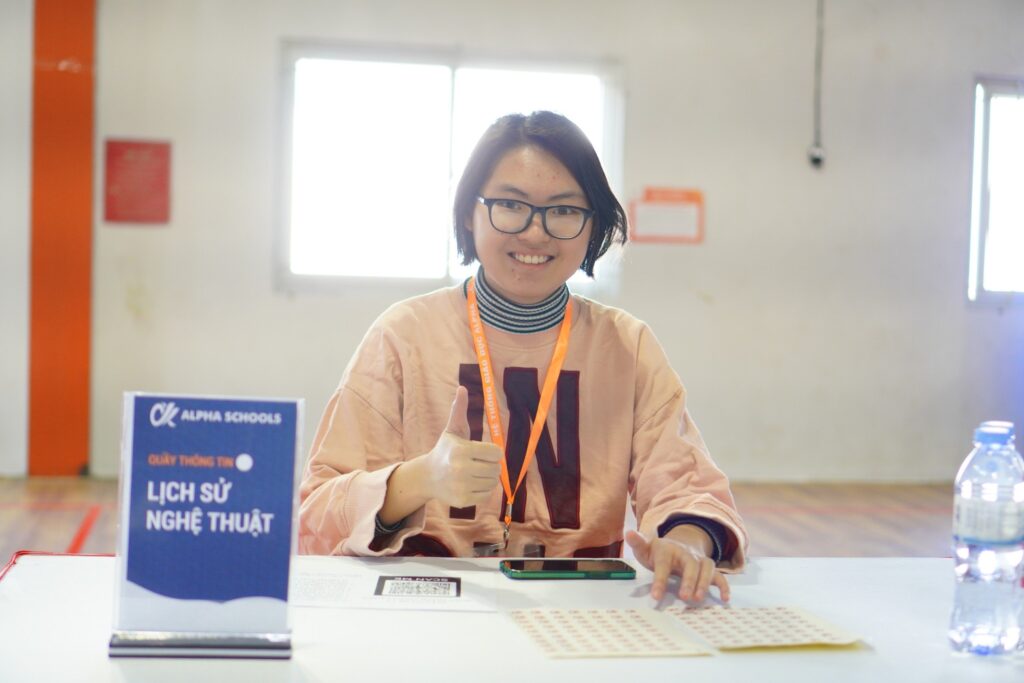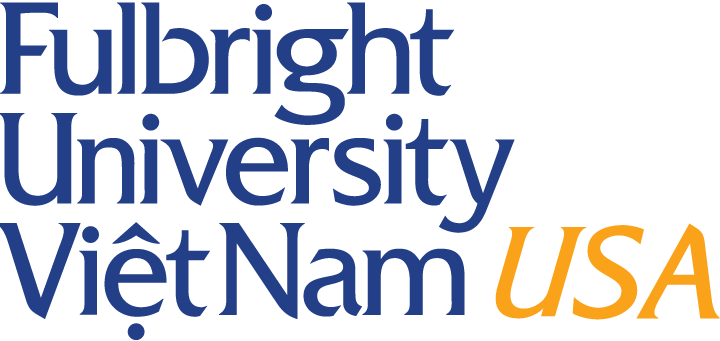
How to support children during their development is a common concern among parents. Recently, Fulbright University Vietnam had a conversation with Ms. Thiên Hương, mother of Lam Khuê, a second-year student, to gain insight into parents’ perspectives.
Lam Khuê is a second-year student at Fulbright University Vietnam. Her mother, Ms. Thiên Hương, had the opportunity to visit her in Ho Chi Minh City recently. During her visit, Ms. Thiên Hương observed her daughter’s academic life, which included student life and courses at Fulbright. Reflecting on her criteria for choosing a university for Khuê two years ago, she noticed significant positive changes in her daughter.
Good morning, Ms. Thiên Hương. Can you tell us about Lam Khuê’s journey to Fulbright?
In the beginning of her 12th grade, Lam Khuê had the chance to attend an admissions event of Fulbright University Vietnam. She was greatly impressed by the Admissions team who inspired her with their vision of a student-centred school that values the holistic development of each student.

Ms. Thiên Hương and her daughter, Lam Khuê
After returning home, Khuê started to research more about the school and Fulbright’s liberal arts education. She was particularly intrigued by the comprehensive application process of the school. Apart from high school grades, she was able to freely express her extracurricular activities, personal interests, and views about the world. In a country where most universities make admissions decisions based on scores, Khuê felt that Fulbright was the perfect educational environment for her.
From a Parent’s Perspective: Why did you agree with Lam Khuê’s choice?
We spent considerable time researching the U.S. liberal arts model offered at Fulbright. We believe that this model will help Khuê better understand her potential.
Throughout her elementary school years, Khuê disliked traditional, one-way learning. She preferred self-study and exploring her interests, which weren’t always encouraged. She expressed a fascination with social subjects but was unclear about her future direction. She didn’t want to limit herself to traditional occupations. For instance, being good at writing doesn’t mean she has to become a journalist or a teacher. She wants to explore more fields. Therefore, my husband and I believe that the liberal arts education at Fulbright will be an excellent fit for her. It allows students to explore various fields in the first two years before deciding on a major.
We’re also impressed by the school’s staff. Khuê’s positive impression of the Admissions team led us to learn more about the Board of Trustees, leaders, and teachers at Fulbright. We hope that Khuê will have ample opportunities to learn from these individuals in her daily life.
Additionally, we’re grateful that Fulbright is the only university in Vietnam that offers Financial Aid based on a family’s ability to pay. The cost of studying at Fulbright is equivalent to studying abroad, and while we’ve tried our best, there’s a portion we can’t afford. Initially, I was apprehensive about sharing our financial situation, but the Financial Support officers made us feel comfortable. I understand that this is necessary for a fair review process.
Moreover, we appreciate Fulbright’s emphasis on extracurricular developmental experiences for students. A prime example is Fulbright’s residential life. Living in the residential community of Fulbright allows Khuê to develop independence while still being in Vietnam, which reassures us. I had considered sending Khuê abroad to develop essential life skills. However, watching my friends worry about their children studying abroad during the Covid pandemic made me appreciate her being closer to home.

Lam Khuê with her parents and sister
How do you believe Khuê has developed, now that she’s in her second year at Fulbright?
After a year, Lam Khuê returned home for the first time. Everyone, from her high school teachers to her parents and sister, noticed her significant transformation, all in a positive direction. She has matured considerably in her thinking and interpersonal skills.
Khuê has developed an open-minded, multi-dimensional way of thinking. She’s no longer stubbornly competitive, but someone who genuinely accepts others’ differences. When faced with a challenge, she thinks deeply, examines it from all angles, seeks information at its source, and strives to understand the problem’s core. Her expressed opinions are persuasive and respectful, as they stem from a thorough understanding of the issues at hand. She exhibits clear critical thinking and expresses her thoughts respectfully.
She listens sincerely, shares emotions with others, and offers help with genuine enthusiasm and clarity. Recently, she had the chance to return to her high school on Career Day to discuss her learning methods and experiences at Fulbright with her former teachers and younger students. Notably, she helped many students broaden their understanding of the Arts beyond conventional categories like “fine arts” or “music,” providing insight into future career prospects in the field.

Khue helped many students broaden their understanding of the Arts beyond conventional categories.
At home, Khuê has become more affectionate and attentive towards each family member. She helps me and my husband more around the house and has become such a delightful sister that all of us are surprised.
These changes are distinct from her previous behavior. Khuê attributes this transformation to her life in the residential life, her classmates, and particularly her teachers at school. From them, she has learned a great deal, as they form a close, lovable, and civil community.
And how about Lam Khuê’s academic development?
Khuê has become passionate about studying and can discuss the content of her subjects enthusiastically for hours with us. She said, “Before, I studied because I had to. Now, I study because I like it and I know I need it.”
She has participated in Fulbright’s foundational subjects spanning many fields. Although her social-oriented study direction has not changed, she has learned to think very logically and systematically in natural subjects. When she interacts with friends with different interests and majors, she communicates comfortably. I think this point is especially important and necessary for her future work. When she is an expert in one field but can still work confidently with people from different specialties. Or later when she wants to change her career to better suit the volatility of society, she has the core skills that every job needs.
My husband and I were also surprised that studying at Fulbright made Lam Khuê more interested in Vietnamese culture and history. She has become more concerned about political, economic, historical, and cultural issues in Vietnam and their significance to the world. She has become a Vietnamese person with a deep and accurate understanding of the culture, aligning herself with global standards. Khuê’s cultural foundation and understanding of her own country enhance her confidence, identity, and empathy towards the community. No matter where she goes, whether she stays in Vietnam or ventures into the world, she remains a decent, polite, and happy individual. From a parent’s perspective, I think People with a solid foundation are always content, regardless of their location or occupation.
